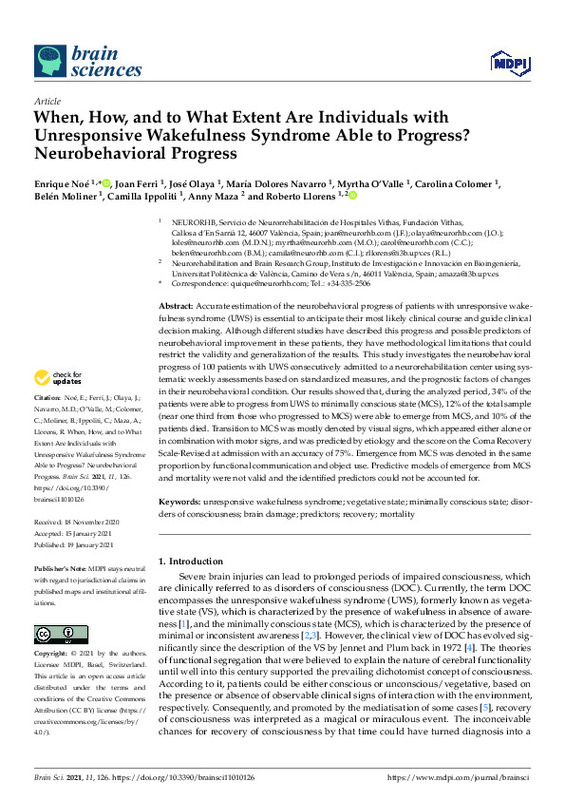JavaScript is disabled for your browser. Some features of this site may not work without it.
Buscar en RiuNet
Listar
Mi cuenta
Estadísticas
Ayuda RiuNet
Admin. UPV
When, How, and to What Extent Are Individuals with Unresponsive Wakefulness Syndrome Able to Progress? Neurobehavioral Progress
Mostrar el registro sencillo del ítem
Ficheros en el ítem
| dc.contributor.author | Noé Sebastián, Enrique
|
es_ES |
| dc.contributor.author | Ferri, Joan
|
es_ES |
| dc.contributor.author | Olaya, José
|
es_ES |
| dc.contributor.author | Navarro, María Dolores
|
es_ES |
| dc.contributor.author | O'Valle, Myrtha
|
es_ES |
| dc.contributor.author | Colomer Font, Carolina
|
es_ES |
| dc.contributor.author | Moliner, Belén
|
es_ES |
| dc.contributor.author | Ippoliti, Camilla
|
es_ES |
| dc.contributor.author | Maza, Anny
|
es_ES |
| dc.contributor.author | Llorens Rodríguez, Roberto
|
es_ES |
| dc.date.accessioned | 2022-02-03T19:04:46Z | |
| dc.date.available | 2022-02-03T19:04:46Z | |
| dc.date.issued | 2021-01-19 | es_ES |
| dc.identifier.uri | http://hdl.handle.net/10251/180474 | |
| dc.description.abstract | [EN] Accurate estimation of the neurobehavioral progress of patients with unresponsive wakefulness syndrome (UWS) is essential to anticipate their most likely clinical course and guide clinical decision making. Although different studies have described this progress and possible predictors of neurobehavioral improvement in these patients, they have methodological limitations that could restrict the validity and generalization of the results. This study investigates the neurobehavioral progress of 100 patients with UWS consecutively admitted to a neurorehabilitation center using systematic weekly assessments based on standardized measures, and the prognostic factors of changes in their neurobehavioral condition. Our results showed that, during the analyzed period, 34% of the patients were able to progress from UWS to minimally conscious state (MCS), 12% of the total sample (near one third from those who progressed to MCS) were able to emerge from MCS, and 10% of the patients died. Transition to MCS was mostly denoted by visual signs, which appeared either alone or in combination with motor signs, and was predicted by etiology and the score on the Coma Recovery Scale-Revised at admission with an accuracy of 75%. Emergence from MCS was denoted in the same proportion by functional communication and object use. Predictive models of emergence from MCS and mortality were not valid and the identified predictors could not be accounted for | es_ES |
| dc.description.sponsorship | This research was funded by the program RISE-Marie-Slodowska-Curie of the European Commission (Grant agreement 778234), by Conselleria de Educacion, Investigacion, Cultura y Deporte of Generalitat Valenciana (SEJI/2019/017), and by Vicerrectorado de Investigacion, Innovacion y transferencia of Universitat Politecnica de Valencia (PAID-06-18) | es_ES |
| dc.language | Inglés | es_ES |
| dc.publisher | MDPI AG | es_ES |
| dc.relation.ispartof | Brain Sciences | es_ES |
| dc.rights | Reconocimiento (by) | es_ES |
| dc.subject | Unresponsive wakefulness syndrome | es_ES |
| dc.subject | Vegetative state | es_ES |
| dc.subject | Minimally conscious state | es_ES |
| dc.subject | Disorders of consciousness | es_ES |
| dc.subject | Brain damage | es_ES |
| dc.subject | Predictors | es_ES |
| dc.subject | Recovery | es_ES |
| dc.subject | Mortality | es_ES |
| dc.subject.classification | TEORIA DE LA SEÑAL Y COMUNICACIONES | es_ES |
| dc.title | When, How, and to What Extent Are Individuals with Unresponsive Wakefulness Syndrome Able to Progress? Neurobehavioral Progress | es_ES |
| dc.type | Artículo | es_ES |
| dc.identifier.doi | 10.3390/brainsci11010126 | es_ES |
| dc.relation.projectID | info:eu-repo/grantAgreement/EC/H2020/778234/EU/ | es_ES |
| dc.relation.projectID | info:eu-repo/grantAgreement/UPV//PAID-06-18/ | es_ES |
| dc.relation.projectID | info:eu-repo/grantAgreement/GENERALITAT VALENCIANA//SEJI%2F2019%2F017//ACTIVA: ALTERACIONES DE LA CONSCIENCIA: PROTOCOLO/ | es_ES |
| dc.rights.accessRights | Abierto | es_ES |
| dc.description.bibliographicCitation | Noé Sebastián, E.; Ferri, J.; Olaya, J.; Navarro, MD.; O'valle, M.; Colomer Font, C.; Moliner, B.... (2021). When, How, and to What Extent Are Individuals with Unresponsive Wakefulness Syndrome Able to Progress? Neurobehavioral Progress. Brain Sciences. 11(1):1-16. https://doi.org/10.3390/brainsci11010126 | es_ES |
| dc.description.accrualMethod | S | es_ES |
| dc.relation.publisherversion | https://doi.org/10.3390/brainsci11010126 | es_ES |
| dc.description.upvformatpinicio | 1 | es_ES |
| dc.description.upvformatpfin | 16 | es_ES |
| dc.type.version | info:eu-repo/semantics/publishedVersion | es_ES |
| dc.description.volume | 11 | es_ES |
| dc.description.issue | 1 | es_ES |
| dc.identifier.eissn | 2076-3425 | es_ES |
| dc.identifier.pmid | 33478033 | es_ES |
| dc.identifier.pmcid | PMC7835897 | es_ES |
| dc.relation.pasarela | S\438079 | es_ES |
| dc.contributor.funder | European Commission | es_ES |
| dc.contributor.funder | GENERALITAT VALENCIANA | es_ES |
| dc.contributor.funder | Universitat Politècnica de València | es_ES |
| upv.costeAPC | 1251,68 | es_ES |








